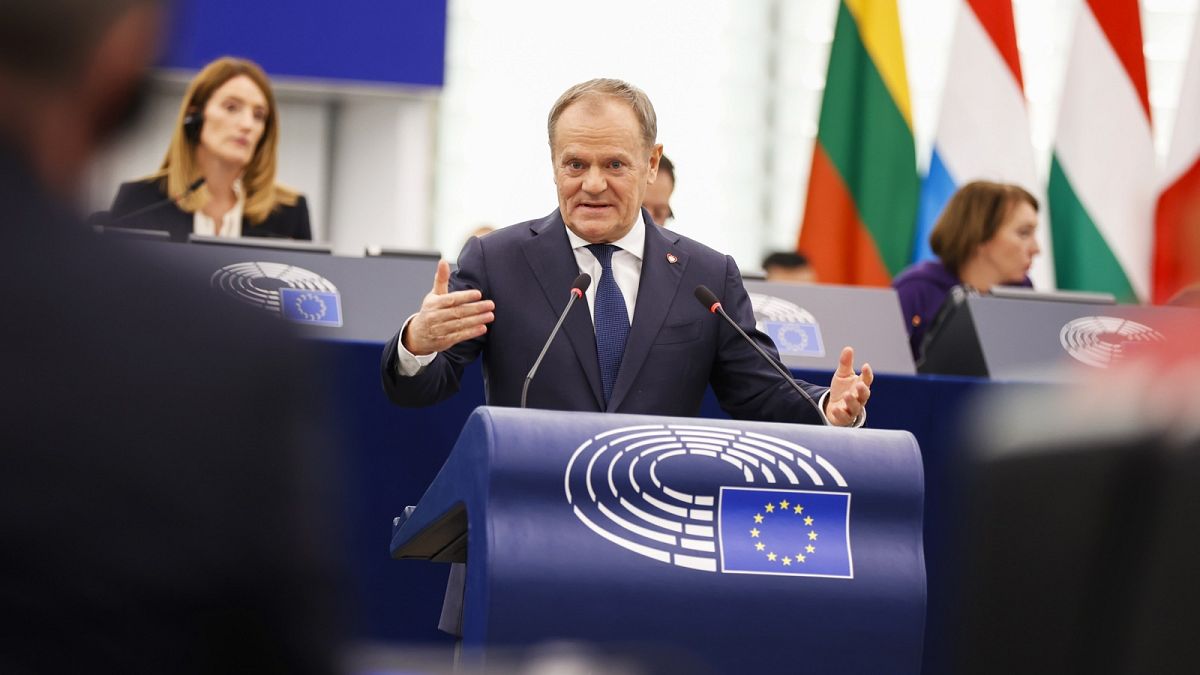In a speech before the European Parliament, Donald Tusk called for a major boost in Europe’s defence spending and a “critical review” of the Green Deal.
“Europe was, is and will always be great,” Donald Tusk declared on Wednesday as he made a passionate plea for ramping up military spending to ensure the continent can defend itself against its adversaries without relying on America’s security umbrella.
“If Europe is to survive, it must be armed,” the Polish prime minister told the European Parliament in a wide-ranging address with a heavy focus on security matters.
“This is not our choice. I am not a militarist. Poland is a place on earth where no one wants any repetition of any war. We suffered the most in Europe,” he went on.
“But maybe that is why we understand so well that in order to avoid a tragic repetition of history, we must all be strong, armed and determined. Strong in spirit, but also strong in our defence capabilities.”
Making references to Russia’s full-scale invasion of Ukraine and Belarus’s campaign of instrumentalised migration, which his country has experienced firsthand, Tusk implored EU states to address security “seriously” and be “flexible” and “creative” to design novel ways to finance the necessary boost in military expenditure.
This effort, which he framed as an “obligation,” could involve the issuance of EU-wide debt, something that Poland and France have advocated. By contrast, Germany and the Netherlands have resisted the pitch. Meanwhile, Denmark, another long-standing frugal, recently changed its mind to embrace the project.
On Wednesday, Tusk admitted that “many joint ventures do not require a systematic revolution” and suggested the cash could be found elsewhere. He did not specify.
“I’ll be honest: we shouldn’t really care too much about what method we adopt to finance pan-European defence projects,” he told lawmakers in Strasbourg.
“There is no alternative to this: Europe must start defending itself, and so it must start spending European money on this as well.”
Tusk devoted a few lines to Donald Trump’s return to the White House, saying the change of power means “the time of comfort is over.” Still, he urged his audience to avoid despair and see the new administration as a “positive challenge” for the bloc’s goals.
During his campaign, Trump said he would encourage Russia to “do whatever the hell they want” against NATO countries that fail to spend 2% of their GDP on defence, sending shockwaves across the Atlantic. After his victory, Trump said the alliance’s target should be raised to 5%, which not even the US meets.
“Do not play down the appeal to spend 5%,” Tusk said on Wednesday. (His country is NATO’s leader in defence spending, with a projected 4.7% for 2025.)
“Don’t ask America what it can do for our security. Ask yourselves what we can do for our security,” he added, paraphrasing John F. Kennedy.
“We need to believe in our strength again. This potential is a fact. We are strong and equal to the greatest world powers. We just have to believe it.”
Green Deal denunciation
Tusk’s speech, meant to present Poland’s priorities for its six-month presidency of the Council of the EU, moved from rousing to scorching when he spoke about energy prices and the Green Deal, the bloc’s ambitious roadmap to achieve climate neutrality by 2050.
In the prime minister’s view, “some” of the environmental regulations that the EU has introduced in the past five years are responsible for the “prohibitively” high energy prices that consumers and companies face today, which, he said, are hurting the bloc’s competitiveness vis-a-vis the US and China.
Energy bills began rising in 2022 when the market hit record-high levels in reaction to Russia’s manipulation of gas supplies. A diversification push has since helped control the worst shocks, even if prices remain well above the historical average.
“Europe cannot lose the global competition. It cannot become a continent of naive people and ideas. If we go bankrupt, no one will care about the natural environment in the world anymore,” Tusk said.
Trump has already renounced the Paris Agreement.
The Polish premier asked the European Parliament to undertake a “full and very critical review” of all the Green Deal laws, prompting applause from right-wing MEPs and disapproval from progressives. Tusk name-checked the expansion of the Emissions Trading System (ETS) that will put a price on the emissions from fuel combustion in buildings and road transport from 2027 as a policy that might lead to “terribly predictable” consequences.
In an ominous statement, Tusk warned high energy prices could provoke enough popular discontent to “wipe out” democratically elected governments and implored lawmakers to relinquish “hard doctrines and ideologies” in favour of “common sense.”
“We really need to get a grip on this issue,” he said.
Blaming the Green Deal for high energy prices and the loss of competitiveness has become a rallying cry for Europe’s conservatives. The backlash began during the debate over the Nature Restoration Law and intensified after the 2024 farmers’ protests.
The link has been contested by the European Commission, the International Energy Agency and environmental NGOs, who argue the root cause of the problem lies in the costly dependence on imported fossil fuels and the slow uptake of renewable systems.
Commission President Ursula von der Leyen, a close ally of Tusk’s, has promised to take decisive action to decrease energy prices for Europeans. But she has also said the original targets of the Green Deal would be maintained, given the severity of the climate crisis.
“We must bring (prices) down while we complete the phase-out from Russian fossil fuels,” she said on Wednesday, one hour before Tusk addressed the Parliament.
“Both objectives are important, and they should go hand in hand.”
Read the full article here


